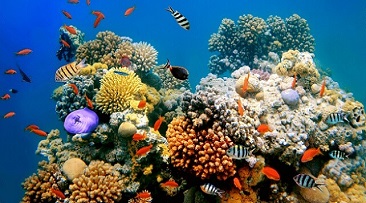 ST. JOHN, USVI—On Monday of this week, March 30, the U.S. Virgin Islands’ historic “Toxic 3 Os” Sunscreen Ban officially went into effect, making the territory the first in the United States to implement a ban of sunscreen chemicals that are known to destroy coral and cause health risks for people. Similar laws in Hawaii and Key West, Fla. are set to commence in January 2021. The USVI ban bars octinoxate in addition to the chemicals included in Hawaii and Key West legislation (oxybenzone and octocrylene), which ensures safer mineral sunscreens that contain zinc oxide and titanium dioxide are the default choice. Science shows that the banned chemicals damage coral reefs, marine life and human health.
ST. JOHN, USVI—On Monday of this week, March 30, the U.S. Virgin Islands’ historic “Toxic 3 Os” Sunscreen Ban officially went into effect, making the territory the first in the United States to implement a ban of sunscreen chemicals that are known to destroy coral and cause health risks for people. Similar laws in Hawaii and Key West, Fla. are set to commence in January 2021. The USVI ban bars octinoxate in addition to the chemicals included in Hawaii and Key West legislation (oxybenzone and octocrylene), which ensures safer mineral sunscreens that contain zinc oxide and titanium dioxide are the default choice. Science shows that the banned chemicals damage coral reefs, marine life and human health.
“These chemicals are at 40 times acceptable levels in some of our territorial waters. This simply cannot be,” said Senator Janelle Sarauw, a sponsor of the bill. “This ban protects the environment, our health and our livelihood. But equally important to laws is building awareness of the dangers of these chemicals versus safer alternatives such as mineral sunscreens. Everyone must do their part.”
“We commend Governor Albert Bryan Jr. and our senators for their dedication to the environment as well as human health. In particular, Senator Janelle Sarauw’s tenacity and commitment made this happen,” said Harith Wickrema, President of nonprofit Island Green Living Assn. “The uncertainty of the current COVID-19 pandemic has us focusing on the safety and wellness of our loved ones first and foremost, closing our shores to visitors. But tourism is our territory’s lifeblood and it will return in time. When it does, the age-old dilemma endures—how do we continue to attract visitors with our natural beauty both on land and below the sea if those very visitors cause damage to these natural riches? Safeguards such as the “Toxic 3 Os” Sunscreen Ban ensure tourism is sustainable. It is our hope that additional locales in the U.S. and other island nations will follow the territory’s lead—we all share the oceans.”
Awareness Campaign Planned
Once visitors are again welcomed to the territory, an education system is being planned which will notify them via their hotels, villas and airlines about the ban. Signage in ports and at the airport will also be in place, with information about switching out toxic sunscreens for products that meet the new mandate.
“It is imperative that our coral and marine life are protected,” said Lisa Hamilton, President of the US Virgin Islands Hotel & Tourism Assn. “We are working with our membership to ensure visitors to our islands have access to safe sunscreens and are informed of the dangers posed by oxybenzone, octocrylene and octinoxate.”
According to NOAA, there is scientific evidence indicating these chemicals are deadly to coral and threaten overall reef health. They wash off people’s bodies when they swim and contaminate through waste-water runoff and cause coral bleaching, ‘zombie’ coral which looks healthy but is unable to reproduce as well as other issues. The good news is that once these chemicals are out of the water, the coral can rejuvenate. These chemicals also cause human cell damage that has been linked to cancer, disrupt hormones and have been found in breast milk, blood and urine.
Coral Reefs—Critical to Marine Life
Coral reefs take up less than one percent of the ocean floor but are home to more than 25 percent of marine life. They are vital to protecting coastlines and supporting life in oceans and have the highest biodiversity of any of the planet’s eco-systems.
It is vital that people take responsibility and use non nano mineral sunscreens. There are a plethora of safe sunscreen options available that contain non-nano zinc oxide and titanium dioxide as the active ingredients, such as those offered by Stream2Sea and Badger. It is also important to wear rash guards, avoid sprays and stay out of the sun during peak hours.
Established in 2004, Island Green Living Assn. is a registered 501 (c)(3) not for profit organization on St. John dedicated to sustainability throughout the USVI.






